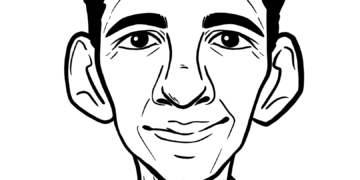Square Books kicked off the 2021 Oxford Conference for the Book on Monday night with a conversation between Mississippi-raised authors Angie Thomas and Kiese Laymon. They discussed Thomas’s new novel “Concrete Roses,” her literary inspirations and her hopes for young Black writers.
Thomas received critical acclaim for her 2017 young adult novel “The Hate U Give,” the story of a 16-year-old Black girl named Starr Carter who witnesses the death of her childhood friend at the hands of police brutality. The novel’s film adaptation released to even stronger popularity, so Thomas spent time reflecting on before and after the novel’s boom in pop culture.
“Had you told me 15 years ago — when I was in Georgetown trying to rap that one day — the First Lady of the United States is going to say she just bought (my) book and is reading it, I would have been like, ‘Get out of here,’” Thomas said.
Her new book “Concrete Roses” released in January and serves as a prequel to “The Hate U Give,” telling the story of Starr Carter’s father Maverick. Thomas and Laymon discussed the main character’s unique name.
The name “Maverick” was inspired by her favorite novel “Roll of Thunder Hear My Cry” by Mildred D. Taylor. When crafting the main character, Thomas said she seeked inspiration from the way J.K. Rowling characterized so deeply in her Harry Potter novels.
One of Thomas’s biggest influences, however, is rapper Tupac Shakur, on whom Maverick is loosely based.
“(Shakur) opened my eyes to the power of storytelling, the power of words and the power of us,” Thomas said. “The love he showed to Black people through his art is contagious. I’m so appreciative to that brother, and I hope that my books honor him, specifically ‘Concrete Rose.’”
Part of the difficulty in portraying a character like Maverick was capturing male sensitivity, Thomas said. In particular, she struggled with deciding on whether she would show the main character crying.
To make the decision, she “immersed herself” in works by Mississippi author Kwame Alexander and Laymon to make sure she represented Black men fairly in her story, as it was a goal of hers to not give a stereotypical portrayal of a Black father.
“I immersed myself in books by Black men, so that I wouldn’t jump into this thinking I knew it all,” Thomas said. “I think the best thing a writer can ever do is be humble. Be humble enough to be wrong.”
To prove a point, Laymon and Thomas even joked about trying to name more than one movie where a Black man cries. It is these kinds of stereotypes that Thomas said she is trying to change with her character, as people like Maverick are not uncommon in America.
When working with such difficult topics, Thomas said young readers are what keeps her motivated as a writer.
“What gets me going, keeps me going, is thinking about being at things like the Mississippi Book Festival, having Black girls and Black boys tell me, ‘I don’t read nobody’s books but yours. You’re dope,’” Thomas said.
Acting as a role model for the younger generation is important to Thomas. As a resident of Jackson, she wants to remain present in the community to interact with the youth and serve as a reminder that their goals are achievable.
Some of this drive comes from her experience in the creative writing program at Belhaven University, a private Christian university in Jackson. Out of 100 students in the program, only four were from Jackson, and Thomas was the only Black student. This led Thomas to ask what could have caused a university in the capital of Mississippi to yield such a relatively small number of Black writers representing the city.
For her next project, Thomas plans to focus a new novel with a fantasy element on a 12-year-old boy growing up in Jackson.




























